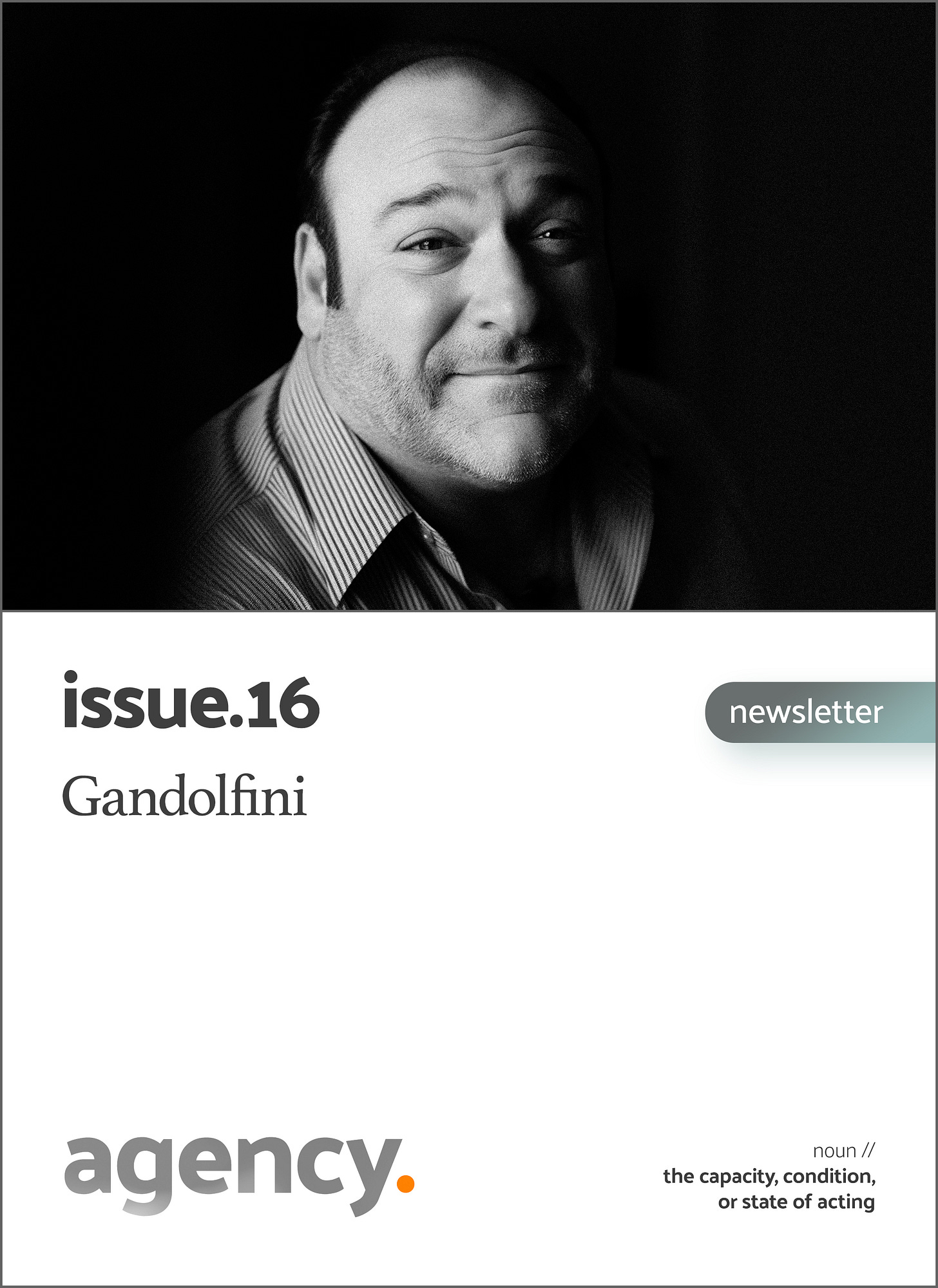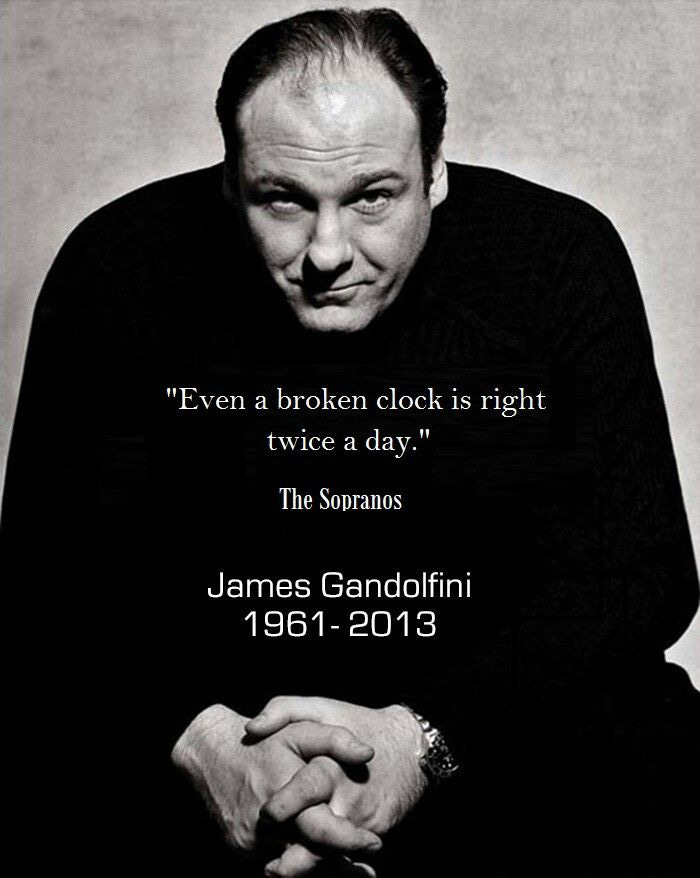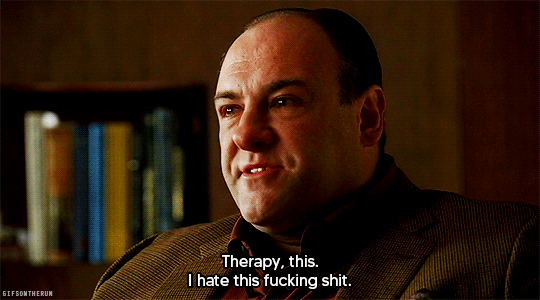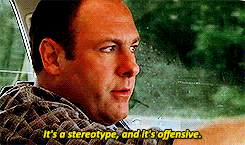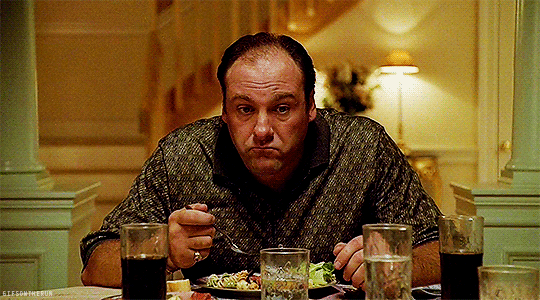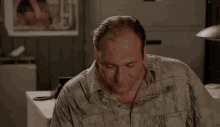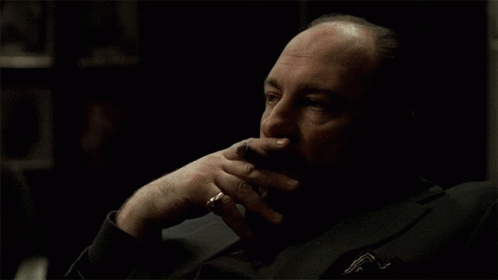Issue.16 - Gandolfini
Even a broken clock is right twice a day.
16. Introduction
Hello reader!
It’s been some time.
I will be honest and straightforward.
This issue has been on the shelf for some time.
But when I first sat down to write it, I made the cover artwork and then I started to feel a deep sorrow. I had to drop it for a while.
It was an unexplainable mix of grief and fear.
Because death is the one subject and event that all of us try to avoid in every single moment of our breathing lives.
Nevertheless, I found the motives and words to write this issue.
Because before being about James Gandolfini, storytelling, TV, dramaturgy, and death, this issue is first about ancestry.
And perhaps it is also a scolding in disguise. In the same italo-American way that James Gandolfini geniously did through his character Tony Soprano.
Because I recognize there is yet another crisis projecting a shadow in society in plain daylight and nobody seems to talk about it.
This does not regard the economy or the environment.
But may very well be the root issue of their cause.
Because this crisis regards to culture.
Most of the entertainment we consume today is made to anesthetize us. They lack the necessary depth and quality to improve our critical thinking and inspire us to be better, to instigate change.
They are wasting our time with cheap stories and superficially written characters.
The Czech-Brazillian professor Vilém Flusser said it first.
“Most contemporary publishing sets out to numb readers. Publisher and writer appear to be no more than functionaries in this benumbing business. They are functionaries, furthermore, who can be replaced by automatic apparatuses in the foreseeable future”
Does Writing Have a Future - Vilém Flusser, P.42 - Published by the University of Minnesota Press
Here’s an important point.
A society that lacks culture is not a society that lacks education. It is a society that has lost its connection to history.
Because culture and art carry historical consciousness.
The term ancestry is derived from the Latin word "antecessor." It can be translated as “Those who came before.”
But there is a huge misconception around it. In addition to being related to family and heritage, ancestors also refer to individuals who are biologically or culturally connected to a person through a line of descent in time.
This means that your ancestors are not only your parents or your grand-grand-grand parents, but they are also every person of important reference that made you who you are today.
Because your ancestors are your true heroes and they live in one of the most important folders of your mind, your memory.
But there is no memory without history.
In the same way that there is no history without culture.
So.
Who are your heroes?
What was their legacy?
Regardless of who they were and what they did, you should praise them.
Say it out loud. Rescue the cultural history that represents you.
Clench your fist and yell in the inner corner of your mind: “I ought to be better for him, for her, FOR THEM!”
Not only because they inspire you but also because we don’t always know what they went through before they changed the world for the better. Before they changed you forever.
The only thing we know is that they are eternal, forever frozen in time because they are worth being remembered and honored.
Are you lacking heroes?
Maybe you are just lacking hobbies or curiosity.
Because your heroes regard your interests and fields of expertise.
Are you lacking inspiring heroes?
Then be more diligent and critical in regard to those you look up to.
Fame, wealth, and glory are three completely different things.
Not everything that shines is always going to be gold. Anybody can be famous nowadays but some people’s fame is dissolved as fast as they are recognized for lacking true depth and relevance. Lacking “atemporality.”
Behind the shimmering veil of wealth lies the illusion of abundance, for true richness cannot be measured by material possessions alone. Some people pursue wealth and power at all costs but exchange immutable resources in that process, like dignity and human values.
To imprint a legacy on society’s scientific, technological, or cultural evolution in our fleeting, short, and ephemerous existence is the true goal of all great minds, for true glory is always tied to honor and admiration, and these attributes, dear reader, like birthmarks, can’t ever be truly bought or manufactured, just either lived, written about or read with your heart.
16.1 Heroes and Villains
And the golden age of television.
“My hero is Darth Vader, don’t you dare underestimate the power of the Dark Side” Someone yells while blazing through the doors and drawing a red lightsaber.
Ok! There’s no need to pull your lightsaber.
Every single one of us is entitled to our own heroes and villains because every single background is uniquely built with its own set of values and principles.
What is a hero, after all?
According to "A Hero with a Thousand Faces" by Joseph Campbell, a hero is a protagonist who embarks on a transformative journey, faces challenges, acquires wisdom, and returns with newfound insight and gifts for their community.
As a conclusion, the villain is the opposing force to that community or protagonist.
If someone claims that Luke Skywalker is the true villain of Star Wars, that opinion shall be respected because opinions are the fruit of freedom of expression.
Historically speaking, it is not 1977 anymore. Star Wars is a cultural sci-fi relic within Cinema but narratively speaking, it is not contemporary.
Society is long past the archetype of perfect heroes, they don’t captivate us that much anymore and the Golden Age of Television can prove that.
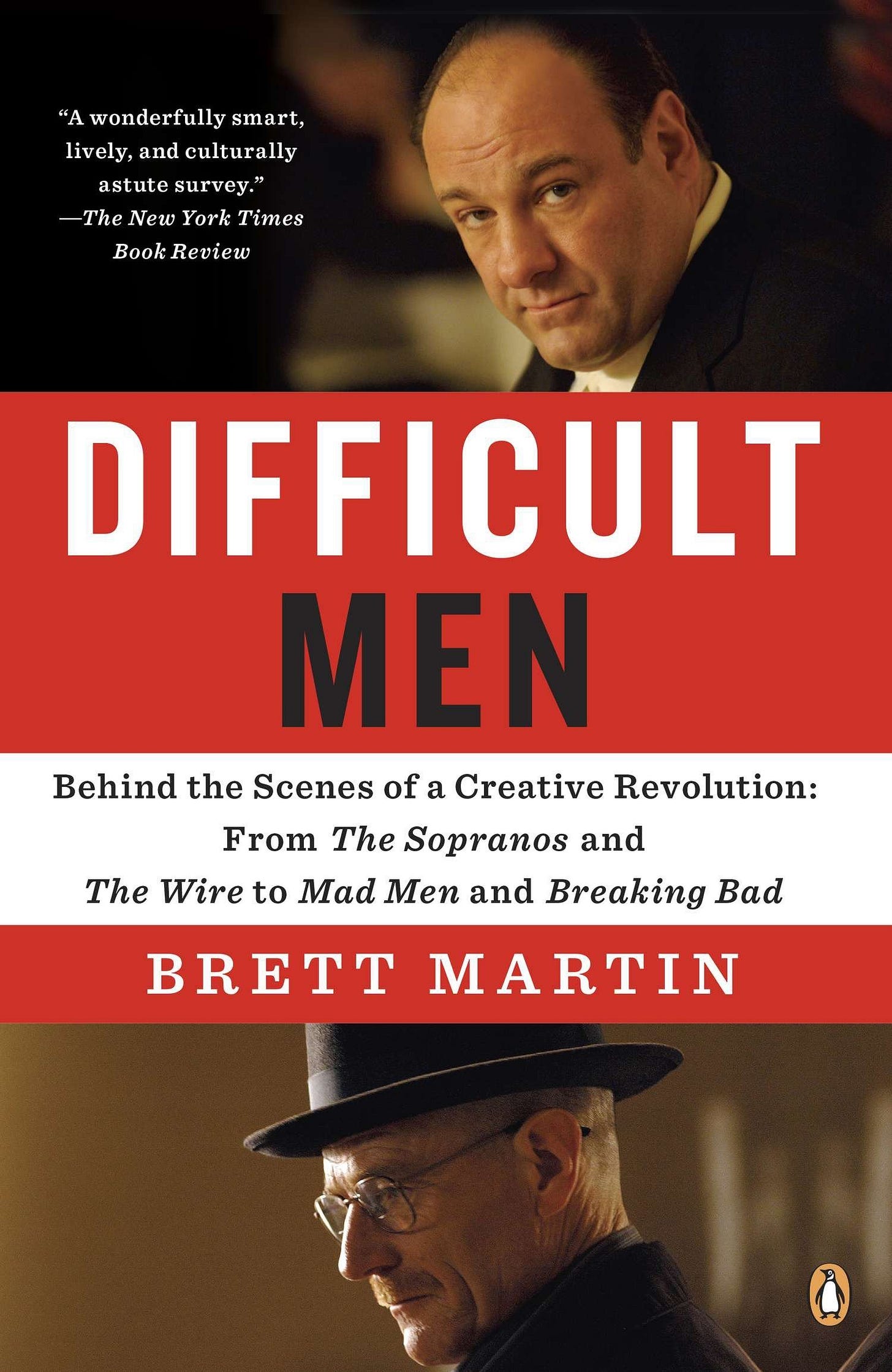
"Difficult Men: Behind the Scenes of a Creative Revolution" is a book written by Brett Martin that explores the rise of complex, morally ambiguous characters in television dramas during what is often referred to as the "Golden Age of Television."
This storytelling revolution was kickstarted on January 10, 1999. When The Sopranos premiered on HBO and forever popularized a new kind of protagonist.
The Anti-Hero.
A protagonist who lacks conventional heroic qualities. They may have flaws, engage in morally ambiguous actions, or possess questionable motivations. Despite their shortcomings, anti-heroes often have redeeming qualities or embark on journeys that challenge their nature.
The main and most important difference between traditional heroes/superheroes and anti-heroes is that the last fully embodies an imperfect human nature.
Like yours.
Like mine.
They are flawed and ambiguous characters that offer nuanced portrayals of complex characters and shift many different moral boundaries.
Sounds weird? Wrong?
Well, it was quite uncommon to see that type of archetype in a story, until James Gandolfini truly made it right. Revolutionizing television and storytelling forever. Paving the way for a period where TV deeply impacted culture and became a completely new standard in entertainment.
Rise of Quality Dramas
The period saw the emergence of critically acclaimed and highly regarded drama series, such as "The Sopranos," "The Wire," "Mad Men," and "Breaking Bad," These shows pushed boundaries, embraced complex storytelling, and elevated the quality of television programming.Increased Production Values: Television production budgets grew significantly during this time, allowing for higher production values, cinematic visuals, and more ambitious storytelling. This resulted in shows with impressive production designs, elaborate sets, and high-quality visual effects.
Viewing Figures: Many popular series from the Golden Age of Television achieved substantial viewership numbers. For example, "The Sopranos" finale attracted around 11.9 million viewers, and the series finale of "Breaking Bad" garnered 10.3 million viewers.
Awards Recognition: The shows from this era received extensive recognition at prestigious awards ceremonies such as the Primetime Emmy Awards, Golden Globe Awards, and Screen Actors Guild Awards. They amassed numerous accolades and critical acclaim, further solidifying their impact on the television landscape.
Subscription-Based and Premium Cable Channels: The Golden Age of Television witnessed the rise of subscription-based and premium cable channels, such as HBO, AMC, and Showtime, which became known for producing high-quality original programming. These channels offered more creative freedom, resulting in daring and boundary-pushing content.
Streaming Services: Towards the end of the era, streaming services like Netflix, Hulu, and Amazon Prime Video began to emerge, revolutionizing the television landscape by introducing original programming and changing viewing habits with on-demand streaming.
16.3 James Gandolfini
And Tony Soprano
James Gandolfini
Unfortunately, we lost Gandolfini while he was still very young. He was only 51 years old when he died in Italy due to a heart attack.
Talking about the show and trying to convince someone to watch it is not really the goal of this issue. The real goal is to praise James Gandolfini because the impact of his work can’t possibly be measured even though it changed how you consume entertainment today.
With that said, the best thing I could do to introduce him is bring some quotes from the actual cast of the show. The cast of "The Sopranos" had immense respect and admiration for James Gandolfini and shared various sentiments about him when he died.
Edie Falco (portrayed Carmela Soprano): "He was a man of tremendous depth and sensitivity, with a kindness and generosity beyond words. I consider myself very lucky to have spent 10 years as his close colleague. My heart goes out to his family."
Michael Imperioli (portrayed Christopher Moltisanti): "Jimmy treated us all like family with a generosity, loyalty, and compassion that is rare in this world. He was a man of tremendous depth and sensitivity."
Lorraine Bracco (portrayed Dr. Jennifer Melfi): "He was a genius. Anyone who knew him or worked with him, on screen or off, knew this to be true."
Steven Van Zandt (portrayed Silvio Dante): "I have lost a brother and a best friend. The world has lost one of the greatest actors of all time."
Jamie-Lynn Sigler (portrayed Meadow Soprano): "He was a dear friend, a mentor, and a father figure to me. He taught me to always find humor in even the darkest of circumstances. I will forever be grateful for the impact he had on my life."
Now some quotes from James himself!
What they say about TV shows is true. You're really a family. You laugh, you fight, you get close, you know? Movies are shorter. They're over quicker. You don't form the same bonds.
It is a dark, dark world. If you're going to be in a dark world, I can't think of any better one to be in. I still think I'm very lucky to be in it.
'The Sopranos' all came down to the writing. I wouldn't have been on for as long as I was if the writing weren't so good.
Trying to capture the essence of his work with a couple of quotes is quite an impossible mission but to be missed and praised like that by colleagues can say a lot about a person.
In fact, there is a very famous Portuguese word known to be unique in our language and it goes as: “Saudade”, it is similar to “Longing” but special in its own way.
And the idea of being missed like that can only come from the recognition of his love, humbleness, work, and the sacrifices he made.
Fairly because one can only wonder what playing a mob boss for 8 years can truly do to your mind as a person and an actor.
The difference between Gandolfini and other actors is that because he died very young, as an actor, his image was deeply embedded in that character.
He did appear in a few movies and tv shows but he was still only starting to revolutionize his craft when we lost him.
Up to the point where HBO was extremely jealous of his image.
‘The Sopranos’ Stars Claim HBO Paid James Gandolfini $3 Million Not to Star in ‘The Office’
Indiewire
Or even up to the point where he was starting to be annoyed by Hollywood.
‘Sopranos’ Actors Remember James Gandolfini’s Threat to Beat Up Harvey Weinstein
Indiewire
But regardless, we were left with his legacy of Tony Soprano, which is a reason to celebrate.
Tony Soprano
The thing about this character and show geniously created by David Chase is that it seized the opportunity to challenge some old conventions with style.
Amidst all the crime and violence themes, the character of Tony develops around the therapy sessions he goes to, where, with the help of Dr. Jennifer Melfi, he tries to better understand the root cause of his anger issues so that regardless of the lifestyle that he inherited from his ancestors, he can be a better loving father and husband.
There was pretty much a lot of taboo around men and psychological care back in 1999 but there was Tony Soprano, a feared mob boss sharing his fears and secrets with a doctor with the only goal of becoming a better person while his work stripped him from his humanity.
Perhaps the most important thing about cultural endeavors like The Sopranos is that in addition to the goal of entertaining us, they can efficiently help us deconstruct core aspects of our personality that are no longer aligned with the times we live in. But that can only happen if the writing is bold and creative enough to understand the issues and present the alternatives.
Of course that there are many different negative stereotypes and prejudices that are also reinforced through Tony, but anti-heroes, nevertheless, aren’t written to be entirely loveable.
“We know that the wildest and most moving dramas are played not in the theatre but in the hearts of ordinary men and women who pass by without exciting attention, and who betray to the world nothing of the conflicts that rage within them except possibly by a nervous breakdown.”
Carl Jung - ”New Paths in Psychology” (1912). In CW 7: Two Essays on Analytical Psychology. P425
Perhaps the most significant sacrifice Gandolfini made was grasping as much of Tony’s shadowy and evil side as he possibly could because that is exactly the part of the character that is able to represent a lot of buried aspects of the personality within every single one of us.
I call it a sacrifice because there is absolutely no way to deny that playing such a powerful archetype can confuse your own values, up to the point that your work starts affecting you personally. In fact, he even said so in a quote.
I don't think I will do a Mafia character again. I want to get away from the violence a little bit, because it is starting to bother me personally.
That is, after all, the true beauty of dramaturgy and storytelling. It is able to forever capture the human essence of life by depicting personalities so intense that are worth being remembered.



